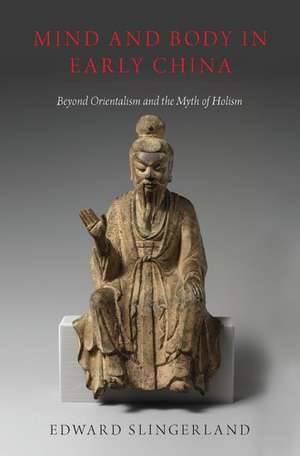Mind and Body in Early China: Beyond Orientalism and the Myth of Holism
Autor Edward Slingerlanden Limba Engleză Hardback – 28 feb 2019
Preț: 251.59 lei
Nou
Puncte Express: 377
Preț estimativ în valută:
48.15€ • 49.74$ • 40.07£
48.15€ • 49.74$ • 40.07£
Carte tipărită la comandă
Livrare economică 15-21 martie
Preluare comenzi: 021 569.72.76
Specificații
ISBN-13: 9780190842307
ISBN-10: 019084230X
Pagini: 400
Ilustrații: 19
Dimensiuni: 163 x 236 x 38 mm
Greutate: 0.66 kg
Editura: Oxford University Press
Colecția OUP USA
Locul publicării:New York, United States
ISBN-10: 019084230X
Pagini: 400
Ilustrații: 19
Dimensiuni: 163 x 236 x 38 mm
Greutate: 0.66 kg
Editura: Oxford University Press
Colecția OUP USA
Locul publicării:New York, United States
Recenzii
The book should be of interest not only to those who are specialists in East Asian religions or Sinology, but to those as well who want to witness where the humanities-science dialogue usually falters and how the trenches between the two could be charitably buried at last.
Mind and Body in Early China appropriately subjects to scrutiny claims about holism in early Chinese thought, and encourages us to approach new types of data with open minds... Slingerland's clear and vehement writing style, and the example of his resourcefulness, can surely spark useful conversations—both among Sinologists and between them and scholars in other disciplines.
All in all,Mind and Body in Early China is a powerful work of original thought and scholarly prowess, and will undoubtedly take its place among the (modern) classics in the field.
Over the last two decades, Slingerland has established himself as one of the leading voices calling for a greater integration between the sciences and the humanities, and Mind and Body in Early China is an excellent example of an effective implementation of this aspiration.
Mind and Body in Early China appropriately subjects to scrutiny claims about holism in early Chinese thought, and encourages us to approach new types of data with open minds... Slingerland's clear and vehement writing style, and the example of his resourcefulness, can surely spark useful conversations—both among Sinologists and between them and scholars in other disciplines.
All in all,Mind and Body in Early China is a powerful work of original thought and scholarly prowess, and will undoubtedly take its place among the (modern) classics in the field.
Over the last two decades, Slingerland has established himself as one of the leading voices calling for a greater integration between the sciences and the humanities, and Mind and Body in Early China is an excellent example of an effective implementation of this aspiration.
Notă biografică
Edward Slingerland is Distinguished University Scholar and Professor of Asian Studies at the University of British Columbia. His research specialties and teaching interests include early Chinese thought, religious studies, cognitive linguistics, ethics, and the relationship between the humanities and the natural sciences.
